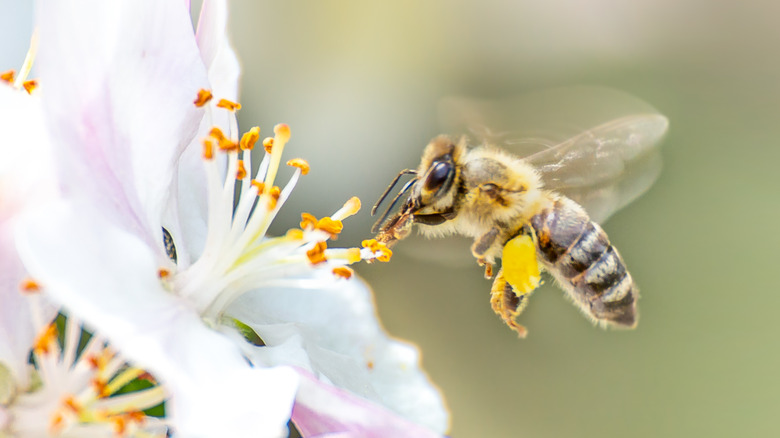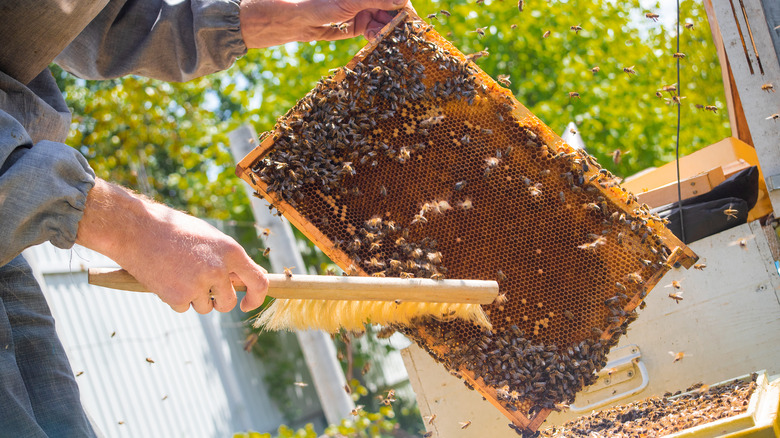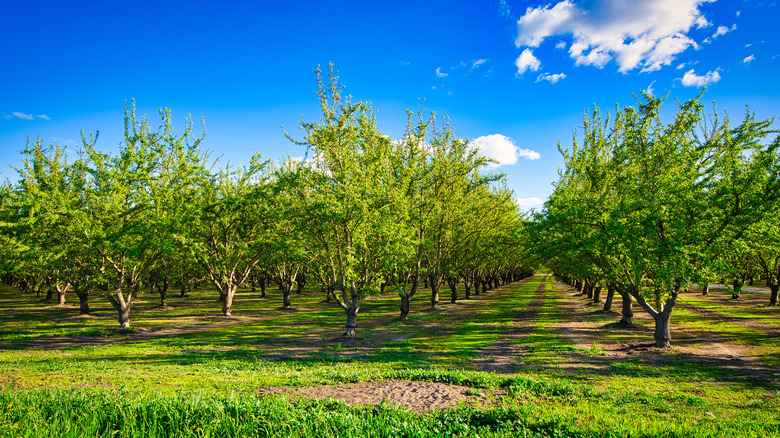Why You Should Be More Concerned About Recent Beehive Thefts
America's bees and those that care for their hives don't have it easy. The University of Miami's Project Dragonfly says honey bees are vulnerable to the climate change threats that have become part of our daily lives, like habitat loss or degradation. Bees are also helpless to defend themselves against disease and pollutants like pesticides, as well as mites and viruses which can infect and decimate honey bee colonies. Together, these factors caused honey bees in the U.S. to lose about 45.5% of their hive population between April of 2020 and 2021 alone, per Penn Live.
But that's not the only problem bees and their keepers face today. On top of this, the insects are in the grip of a seasonal threat, which recurs about the same time almond trees begin to bloom in California in what ABC called "the largest pollination event in the world." That's when bees are trucked to the Golden State and rented to almond growers, who need the precious pollinators to ensure that the almond crop can grow and be harvested as scheduled. Unfortunately, while the beehives might be able to get to their destinations — some won't make the journey home thanks to bee rustlers, who have been known to steal hives out of almond orchards.
Bee rustlers are targeting individual growers and large companies
ABC reports that in the last few weeks, more than 1,000 beehives worth hundreds of thousands of dollars were stolen from almond orchards around California — the most egregious of these involved the theft of nearly 400 hives from a field in Mendocino County. State beekeepers offered a reward of $10,000, and the thief was caught with the help of an anonymous tip. Most of the boxes, along with a forklift, were recovered. Investigators also found frames (which are used to store and support the honeycomb) belonging to a beekeeper whose insects were stolen last year.
Individual beekeepers aren't the only victims that are being targeted by experienced bee rustlers. The Giant Company lost three beehives and their colonies from their corporate headquarters earlier this year. That loss amounted to about 60,000 bees. In a press release sent to PennLive, the company's community impact manager, Jessica Groves, said: "Bees are an essential part of our food supply chain and having these beehives were one way we were helping to address the declining bee population here in our hometown community. We are extremely disappointed that this happened and are continuing to cooperate with Middlesex Township Police Department."
Beekepers suspect thieves come from within the industry
Because of the way the thefts are being carried out, some are convinced that the perpetrators are fellow beekeepers. University of California, Davis beekeeper researcher Charley Nye told The Guardian in 2020: "Normal people can't just go steal 500 hives with a forklift and a truck. So it's a pretty small pool of people that are able to steal them. But the reward is so big that I think it can be tempting to people to do that."
One beekeeper, who had 488 boxes stolen in 2020, lost $100,000 in pollination fees when his hives were taken in the dead of night, per The Guardian. When thefts like this occur, hive owners and growers lose out. Detective Rowdy Jay Freeman who specializes in hive thefts, tells ABC that "More often than not, they [the bee rustlers] steal to make money and leave the bees to die." That effectively leaves even fewer pollinators to get the job done.
Having fewer pollinators don't just hurt California's almond harvest and beekeepers' bottom-line, the shortage also threatens the health of produce grown in California's Central Valley, which is responsible for a quarter of all produce grown in the country — including grapes, lemons, apricots, and lettuce. That part of California doesn't have enough local bees to pollinate produce; which means everyone benefits when beehives are trucked in to help the area out, just as everyone loses — from growers to consumers — when the pollinators aren't protected.


